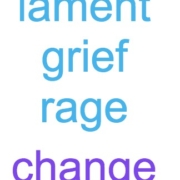5782 is a Jewish leap year, which means we get an extra month. In most years, there is a single month of Adar. This year, we get two of them. The first one is happening right now….
This week’s Torah portion contains one of my favorite verses: “Let them make Me a sanctuary, that I might dwell among them.” The Hebrew could also mean “within them.” We build God a sanctuary so that God — holiness, love, justice — can dwell within us….
Dear Congregation Beth Israel members and friends,
Today has been declared a National Day of Mourning and Lament. And oh, there is so much to mourn.
Right now we’re living both with the unthinkable tragedy of the global pandemic, and with the reality of of racism and violence toward people of color.
More than 100,000 human beings have died from covid-19 in our nation alone, and many more worldwide. And we know that the pandemic disproportionately impacts poor communities and people of color. The systemic racism that is part of American life makes the pandemic worse for communities of color than it is for communities that are white.
Last week George Floyd z”l (may his memory be a blessing) became the latest in a long line of Black people killed by police. Perhaps you have seen video of the officer kneeling on his neck as he gasped, “I can’t breathe.” It’s an act of horrific violence. In response, waves of brokenhearted and furious protest have raged nationwide.
Many of you have asked me what to do with feelings of lament, grief, and rage about all of these things.
My first answer is that we need to feel them, as painful as they are. And my second answer is that our lamentations, our grief, and our righteous anger must transform our actions. Authentic spiritual life asks us to feel the full spectrum of human emotions, from the highest joys to the lowest griefs. And Jewish life and practice invite us to use those emotions, both the bitter and the sweet, to fuel our pursuit of a better world.
In our spiritual calendar, the summer season includes a period of communal mourning called the Three Weeks. That season of mourning reaches its low point with Tisha b’Av, the darkest day of the Jewish year. And Tisha b’Av, in turn, is our springboard into the season of teshuvah, introspection and change that leads us to the Days of Awe.
Right now it feels like our whole nation is living in the Three Weeks. (Maybe the whole world.) Our hearts may feel shattered by the enormity of the pandemic and the tremendous suffering it has caused — and also by the enormity of systemic racism, which has tarnished the soul of our beloved country since the days of human chattel slavery.
The brokenness is everywhere. It’s so vast that words of hope and comfort feel inapt and almost inappropriate. How can I say that everything will be all right when right now nothing seems “all right” at all?
But I can say this: it’s our job to repair what is broken. In our society, in our civic life, as Americans and as Jews it is our job to care for those who mourn and to work for a world of justice for all. I welcome your suggestions on how we can do that as individuals and as a community.
May we emerge from this pandemic season of communal grief with strengthened resolve to build a world of greater justice and love.
As always, I’m here if you need to talk, and I’m holding all of you in my heart.
Rabbi Rachel
For further reading:
- URJ Statement: Witnessing Protests, Rage, and Our Torah’s Unbending Demand for Justice from the Union for Reform Judaism
- Racial Justice Resources from the Religious Action Center of the Union for Reform Judaism
- Anti-Racism Resources from T’ruah: the rabbinic call for human rights
- 10 Steps to Non-Optical Allyship by Mireille C. Harper
- Anguish and Action: resources for a more just and equitable world, from President Obama
Update as of 3/13: we are taking several concrete steps to slow the spread of the virus. Read about them here: Update: CBI in this time of pandemic.
Also see: Like a fiddler on the roof, my message to the community before Shabbat on 3/13.
Dear Congregation Beth Israel members and friends,
Shortly before Shabbat, a member of our community asked me about plans to ensure pastoral care and community connection if the coronavirus becomes classified as a global pandemic.

The fact of the virus and its spread are anxiety-provoking. For that reason, our needs for community and connection (and/or for pastoral conversations and spiritual support) may increase. When the world becomes overwhelming, we need each other more. And we may need rabbis and spiritual directors and therapists and other sources of emotional and spiritual support more, too.
And, depending on what happens with the coronavirus, our need to connect could meet with some challenges. Across Asia and now also in some European nations, quarantines are in effect, and in some countries religious services have been suspended. What will we do at CBI if those things happen here?
I truly don’t expect those things to happen in northern Berkshire. But if they do, please know that I am prepared to provide pastoral care and spiritual support via email, text messages, phone calls, FaceTime, or Zoom videoconferencing. If we’re not able to sit down face to face, we can still find ways to converse and connect. I promise that I am still here to listen when you need to talk.
And in the highly unlikely event that religious gatherings must be suspended for a time, we can explore holding Shabbat services via Zoom and/or via Facebook Live. Again, I don’t expect this! But if there is a period of time during which we’re asked to avoid gathering in person, we’ll find other ways to connect with each other and to join our voices and our hearts together in prayer and song.
As of now I don’t expect any disruption in what we do at CBI. I anticipate that we will gather on March 9 for Purim, and on April 9 for Pesach, and on all of the Shabbatot in between! (Please RSVP for the seder; seats are limited.) Edited to add: our second night community seder is canceled and we are now meeting for Shabbat services via zoom for a while. But if the situation changes and we need to connect via virtual / digital means for a while, we will use every tool at our disposal to stay connected as a community.
Meanwhile, there are simple things we can do to help protect ourselves and each other. Wash hands often (here are instructions for how to do so properly) and use hand sanitizer. Avoid touching your face. If you are experiencing flu-like symptoms, especially fever and/or cough, please stay home… and let us know if you want your name on our Mi Sheberach (healing) list.
I’m enclosing some links below that I hope will be helpful. Please don’t hesitate to reach out if you want to talk about this or about anything else.
Blessings to all,
Rabbi Rachel
Some potentially helpful links:
On the spiritual front:
- In the face of pandemic: mitzvot, R’ Ruth Adar
- How to thrive in this broken world, R’ Rachel Barenblat
- 7 tips to retain your sanity when the news is challenging, R’ Jill Zimmerman
- Inner Calm: Overcoming Worry and Anxiety, R’ Aryeh Sampson
Only the first one of these is specifically about coronavirus, but hopefully they are nourishing in other ways.
On the practical front:
- Coronavirus: Safety and Readiness Tips for You, the American Red Cross
- Preparing for coronavirus to strike the US, Zeynep Tufekci, Scientific American
- How to prepare for coronavirus, The New York Times
- How to prepare for coronavirus in the United States, The Washington Post








